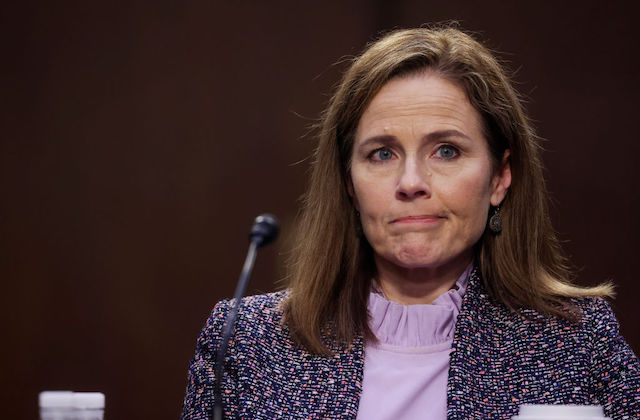President Trump’s latest Supreme Court nominee, Amy Coney Barrett, spent a lot of time dodging questions as she sat for hours of questioning by 22 members of the Senate Judiciary Committee over three days.
As NPR reports, the hearings, which began on Monday (October 12) exposed very little information about Barrett’s views on critical legal issues, including health care, abortion rights, voting rights and gun laws. Here are our biggest takeaways from Judge Barrett’s confirmation hearings:
Judge Barrett’s Confirmation Is All But Guaranteed
There is very little question that Barrett will end up on the U.S. Supreme Court. Judiciary Chairman Lindsey Graham (R-South Carolina) said at the start of the hearings, "This is probably not about persuading each other unless something really dramatic happens. All Republicans will vote yes and all Democrats will vote no."
Barrett Does Not Consider Roe v. Wade to Be a “Super-Precedent” Case
While responding to questions from Minnesota Sen. Amy Klobuchar (D), Barrett said she considered a half-dozen cases to be "super-precedents,” which means they can’t be overturned because they are established law. Brown v. Board of Education made her list, but Roe v. Wade did not.
"Roe is not a super-precedent because calls for its overruling have never ceased, but that doesn’t mean that Roe should be overruled,” Barrett told Klobuchar. According to NPR, “that led Klobuchar and other Democrats to conclude that she was open to considering a challenge to abortion laws. Klobuchar lamented that without answers one was left to ‘follow the tracks’ based on Barrett’s writings.”
Barrett Does Not Believe Trump Is Using Her to Possibly Rule on a Contested Election
With President Trump threatening legal challenges if the election doesn’t go in his favor just a few weeks before the election, Judge Barrett was asked if she would recuse herself if such a case came before the high court. She said she would do what’s expected of justices when asked to determine the appropriateness of their ruling on a case. However, she pushed back at the idea that her nomination is part of a larger plot to tip the scales in Trump’s favor. "I certainly hope that all members of the committee have more confidence in my integrity than to think I would allow myself to be used as a pawn to decide this election for the American people," she said.
The Mother of Seven Won’t Denounce Separating Migrant Children From Their Guardians
As The Washington Post reports, Barrett wouldn’t say whether she thought Trump’s “zero tolerance” family separation policy was wrong while speaking to New Jersey Sen. Cory Booker (D). “That’s a matter of hot political debate in which I can’t express a view or be drawn into as a judge,” she said.
Judge Barrett Won’t Offer Her Thoughts on LGBTQ Rights
As The New York Times reports, Barrett refused to say “where she stood on Griswold v. Connecticut, a 1965 decision that struck down a law that made the use of contraceptives a crime and served as a basis for later cases protecting abortion and gay rights.”
Judge Barrett Can’t Confirm or Deny That Climate Change Is Real
During an exchange with Sen. Kamala Harris of California, the Democratic candidate for vice president, Barrett referred to climate change as “controversial.”
“Do you believe that climate change is happening and threatening the air we breathe and the water that we drink?” Harris asked. Judge Barrett responded, “You asked me uncontroversial questions, like Covid-19 being infectious or if smoking causes cancer” to garner “an opinion from me on a very contentious matter of public debate,” climate change.
“I will not do that,” Judge Barrett added. “I will not express a view on a matter of public policy, especially one that is politically controversial."
